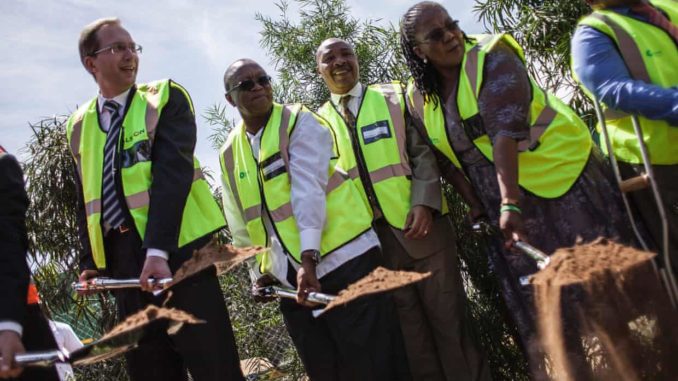
Africa is the coming continent. Its population is predicted to double to 2 billion people over the next three decades. That growth will mean enormous opportunities for business and investment, but will also create huge challenges around sustainability and the environment.
An Africa focus is therefore essential, particularly for a post-Brexit Britain.
The 2020 UK-Africa Investment summit, which takes place in London on Monday, should be the occasion to open a new chapter in Britain’s relationship with Africa.
Up to now, despite the significant amounts of aid Britain spends and the strong political and diplomatic footprint it has in Africa, investment lags.
Between 2014 and 2018, UK direct investment into Africa was $17bn (£13bn), well below China’s $72bn, France’s $34bn, the US’s $31bn, and the United Arab Emirates’ $25bn. This needs to change. Africa provides a huge opportunity for the UK to maintain its global economic standing: one in every four consumers worldwide will be African by 2050, while eight of the 15 fastest growing economies are in Africa.
There is a fresh competition for influence in Africa. Beyond China and its ever-strengthening and well-documented presence, Germany is proactive in encouraging investment by its large manufacturers – such as Siemens and Volkswagen – in countries like Rwanda and Ghana. France is evolving its relationship with Africa to one that invests in adding local value, for example through Alstom’s train manufacturing venture in South Africa and Renault’s new plans for a plant in Ghana. Nations like India, Turkey, Russia, Brazil, the Netherlands and Israel are scaling up investment, trade and economic cooperation.
Many African governments have set investment as their top development priority. Current levels will still leave Africa with a “jobs gap” of 50 million by 2040. So they want a switch to investment that creates value and jobs on the continent, through manufacturing, agro-processing, tourism and information and communications technology.
The unequivocal demand I hear from African leaders is for investment that will spur the industrialisation of the continent and eradicate poverty – a pressing challenge, given the population growth and the fourth industrial revolution.
One issue we need to address is the gap between the real and perceived risk of investing. We need to engage countries in improving the environment for business. PVH, which produces clothing brands like Calvin Klein and Tommy Hilfiger, has invested successfully in Ethiopia, as has Vodafone in Ghana and Kenya. The key element in each case was an effective collaboration between the investor and the government.
Effective dialogue is critical to address the main bottlenecks holding back transactions, and to set a suitable regulatory and enabling environment for transformative sectors. There is a new commitment from presidents and civil servants to improve conditions for transformative private investment – from Senegal to Mozambique, and from Kenya to Ivory Coast. It is a strong basis for optimism.
But effective government is key. My institute is releasing two case studies on industrialisation – one on Ethiopia’s manufacturing sector and the other on Tamil Nadu, one of India’s best-performing states. I believe they show how transformative private investment was underpinned by effective government with visionary and empowered local leadership. They also show that building institutional capability for the enabling environment takes time.
The London conference is an opportunity for the UK government to change the framing of its relationship with Africa, to one based on economic cooperation rather than simply an aid-based, donor-recipient relationship. While aid is important, the nature of the relationship, and of aid itself, must increasingly be centred on countries’ own plans for their industrialisation. In this way we can be more responsive to Africa’s emerging class of leaders, who know that the future of Africa lies in African hands.
There are precedents. In 1959, the UK government gave a grant to Malta – where development was at the time on a par with many African countries today – worth a staggering 43% of its GDP. The grant was used to implement an export-based industrial policy, centred on manufacturing, ship repair and tourism. It developed industrial parks, built hotels, established private-sector facilitating institutions in the government, and facilitated the attraction of investment into the country.
Establishing economic cooperation partnerships with African countries – such as scaled up versions of the one the UK launched late last year with Ghana – is essential to support governments to fix bottlenecks and facilitate investment in job-creating sectors. As the UK rethinks its standing in the world, Africa needs to be front and centre of its plans. If we can use the UK-Africa investment summit to become a true economic partner to African countries, it would be of great strategic benefit to the continent and to the UK.
END

Be the first to comment